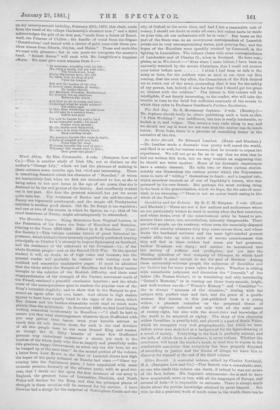Geraldine and her Suitors. By M. C. M. Simpson. 3
vols. (Hurst and Blackett)--Thera are not a few authors and authoresses whom no one particularly wishes to meet in society after the first interview, and whose books, even if the conscientious critic be bound to pro- nounce them clever, aro, nevertheless, intensely disagreeable. There are other people, on the contrary, whom even the unsocially-disposed greet with alacrity wherever they may come across them, and whose books the burdened reviewer and the most light-minded general reader alike take up with a smile of serene consciousness that they will find in them neither bad souse nor bad grammar, neither ill-nature nor slang ; and neither be introduced into the society of ruffians and profligates, nor yet into the blinding splendour of that company of Olympos to which Lord Beaconsfield is good enough to act the part of Hermes. Among these universally-welcome people, the authoress of Geraldine and her ,Suitors has for some years taken her place. Whether in editing with remarkable judgment and discretion the "Journals" of her father (Mr. Nassau Senior), or in translating and ably introducing " Guizet's Memoirs," or in turning out these ivory-smooth, bright, and well-written novels—" Winnie's History " and " Geraldine "— she is always " mistress of the situation," dealing with her subject with perfect ease and tact, and the grace of a gentle. woman. Her heroine in this just-published book is a young widow, a pleasant variation on the perpetual theme of chits of eighteen endowed not only with all the solid sense of twenty-eight, but also with the savoir-faire and knowledge of the world to be acquired at eighty. The story of this charming widow Geraldine is prettily told, and placed iu a part of South-Wales, which we recognise very well geographically, but which we have before never seen sketched as a background for the figure-drawing of a novel of society. Everything in the book is perfectly natural, and the talk, of which there is abundance, is never tedious. Whether the conclusion will break the reader's heart, or send him to repose in the comfortable conviction that everybody has been properly disposed of according to justice and the fitness of things, wo leave him to discover for himself at the end of the third volume.






































 Previous page
Previous page